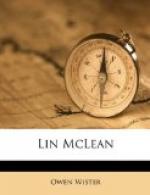Above, on the hill, the graveyard quietly chronicled this new epoch of Drybone. So-and-so was seldom killed very far out of town, and of course scalping had disappeared. “Sacred to the memory of Four-ace Johnston, accidently shot, Sep. 4, 1885.” Perhaps one is still there unaltered: “Sacred to the memory of Mrs. Ryan’s babe. Aged two months.” This unique corpse had succeeded in dying with its boots off.
But a succession of graves was not always needed to read the changing tale of the place, and how people died there; one grave would often be enough. The soldiers, of course, had kept treeless Drybone supplied with wood. But in these latter days wood was very scarce. None grew nearer than twenty or thirty miles—none, that is, to make boards of a sufficient width for epitaphs. And twenty miles was naturally far to go to hew a board for a man of whom you knew perhaps nothing but what he said his name was, and to whom you owed nothing, perhaps, but a trifling poker debt. Hence it came to pass that headboards grew into a sort of directory. They were light to lift from one place to another. A single coat of white paint would wipe out the first tenant’s name sufficiently to paint over it the next comer’s. By this thrifty habit the original boards belonging to the soldiers could go round, keeping pace with the new civilian population; and though at first sight you might be puzzled by the layers of names still visible beneath the white paint, you could be sure that the clearest and blackest was the one to which the present tenant had answered.
So there on the hill lay the graveyard, steadily writing Drybone’s history, and making that history lay the town at the bottom—one thin line of houses framing three sides of the old parade ground. In these slowly rotting shells people rioted, believing the golden age was here, the age when everybody should have money and nobody should be arrested. For Drybone soil, you see, was still government soil, not yet handed over to Wyoming; and only government could arrest there, and only for government crimes. But government had gone, and seldom worried Drybone! The spot was a postage-stamp of sanctuary pasted in the middle of Wyoming’s big map, a paradise for the Four-ace Johnstons. Only, you must not steal a horse. That was really wicked, and brought you instantly to the notice of Drybone’s one official—the coroner! For they did keep a coroner—Judge Slaghammer. He was perfectly illegal, and lived next door in Albany County. But that county paid fees and mileage to keep tally of Drybone’s casualties. His wife owned the dance-hall, and between their industries they made out a living. And all the citizens made out a living. The happy cow-punchers on ranches far and near still earned and instantly spent the high wages still paid them. With their bodies full of youth and their pockets full of gold, they rode into town by twenties, by fifties, and out again next morning, penniless always and happy. And then the Four-ace Johnstons would sit card-playing with each other till the innocents should come to town again.




